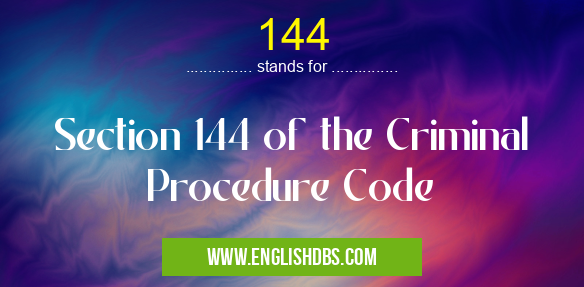What does 144 mean in LAW & LEGAL
Section 144 of the Criminal Procedure Code (CrPC) is an important provision that empowers the executive magistracy to issue orders in urgent cases of nuisance or for speedy prevention of danger to human life, health or safety, and peaceful enjoyment of property. This section enables a magistrate's order with the force of law when necessary to prevent and effectively contain such situations.

144 meaning in Law & Legal in Governmental
144 mostly used in an acronym Law & Legal in Category Governmental that means Section 144 of the Criminal Procedure Code
Shorthand: 144,
Full Form: Section 144 of the Criminal Procedure Code
For more information of "Section 144 of the Criminal Procedure Code", see the section below.
Full Form
The full form of Section 144 is “Code of Criminal Procedure (CrPC) Section 144”.
Essential Questions and Answers on Section 144 of the Criminal Procedure Code in "GOVERNMENTAL»LAW"
What is Section 144 of the Criminal Procedure Code?
Section 144 of the Criminal Procedure Code (CrPC) empowers executive magistrates to issue orders in urgent cases of nuisance or apprehended danger of some event that has the potential to cause a serious disturbance to public tranquility. Such orders are typically issued to prevent and avoid any violation of law and order.
What type of orders can be issued under Section 144?
Under Section 144, an executive magistrate can issue orders prohibiting certain activities in a locality or area such as assembly of five or more people, carrying weapons, creating public nuisance, disobeying lawful orders, etc.
Can anyone apply for Section 144?
Section 144 can only be invoked by an executive magistrate who believes it is necessary to maintain public peace and order in the region in question.
For how long does an order under section 144 last?
The duration for which a magistrate’s order under section 144 remains effective depends on the discretion of the magistrate and could range from two months to six months. The maximum period can also be extended by the State government or by High Court if needed.
Is a violation of a section 144 order punishable?
Yes, violation of a section 144 order is punishable under section 188 of Indian Penal Code 1860, with imprisonment which may extend up to 1 month or fine which may go up to 500 rupees or both.
Does Section 144 require approval from higher authorities?
Generally no; however in some cases where the state government deems it necessary they have authority to overrule any decision taken by an executive magistrate regarding issuance/enforcement/revoking an order issued under Section144 CrPC 1860.
Final Words:
In conclusion, Section 144 of the Criminal Procedure Code allows magistrates to impose restrictions in order to protect society from any potential harm or disruption caused by unrest or violence. This provision provides invaluable assistance in maintaining law and order during crises like riots or terrorist attacks when there is a need for swift action without waiting for legislation from Parliament. It is thus an important part of criminal legal system ensuring safety and security among citizens.
